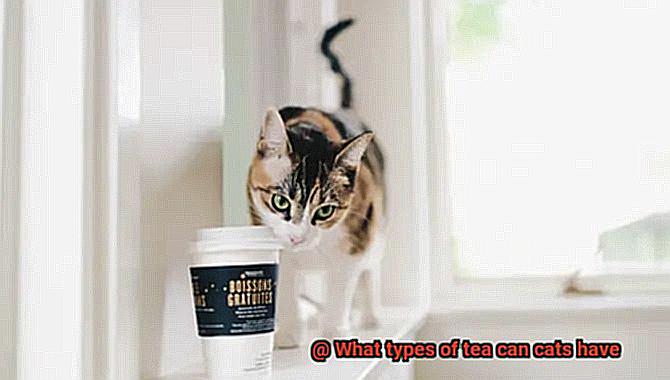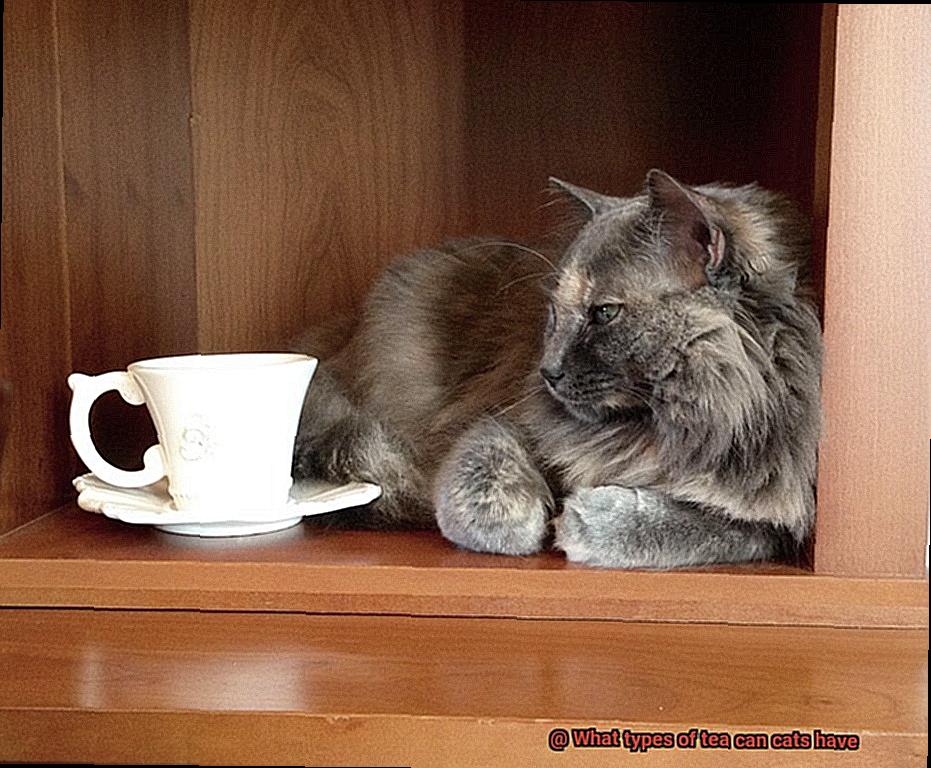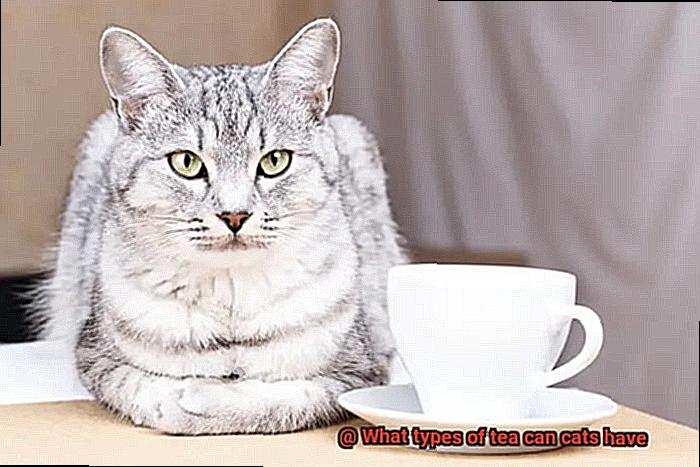Do you love snuggling up with your furry feline friend and sipping on a comforting cup of tea? If you’re wondering whether it’s safe to share your tea with your cat, the answer is a resounding yes. In fact, tea can have some positive effects on cats too.
But before you start pouring your cat a cuppa, it’s important to know which types of tea are safe and which could potentially harm your furry friend. In this blog post, we’ll explore the various types of teas that are safe for cats to consume and highlight their benefits. We’ll also touch upon the risks associated with certain types of tea to help keep your cat healthy and happy.
From classic tea flavors like chamomile and green tea to lesser-known teas like catnip tea, we’ve got you covered. You’ll learn how much tea is safe for your kitty companion to drink and how often they can indulge in their favorite brews.
So whether you’re a dedicated tea lover or just curious about what teas are safe for cats, keep reading to discover all the different types of teas that your furry friend can safely enjoy.
What is Tea?

Tea, a popular beverage enjoyed by humans for centuries, is made by steeping leaves, stems, or buds of the Camellia sinensis plant in hot water. The resulting flavor and type of tea depend on how the leaves are processed after harvesting. The four main types of tea are black, green, oolong, and white.
Black tea is the most common type and has a strong, bold flavor due to the full oxidation of the tea leaves before they are dried and processed. On the other hand, green tea is lighter and more delicate as it undergoes steaming or pan-frying to preserve the natural antioxidants and nutrients found in the tea leaves. Oolong tea is a partially oxidized tea that has a floral or fruity taste, while white tea is the least processed type made from the youngest leaves and buds of the plant with a mild, slightly sweet flavor prized for its high concentration of antioxidants.
While humans can enjoy different types of teas, it’s important to note that not all types of teas are safe for cats to consume. In fact, some can be harmful or even toxic to them due to caffeine content. However, there are some types of tea that are safe for cats to consume in moderation.
Catnip tea is a safe type of tea that can be an enjoyable treat for your feline friend. It’s made from dried catnip leaves and can soothe their stomach, reduce stress and anxiety, and help with digestion. Chamomile tea is another safe option known for its calming properties that can relieve stress and anxiety in cats while promoting relaxation and digestion. Just make sure you’re using pure chamomile tea without any harmful added ingredients.
Green tea is another type of tea that cats can consume in moderation as it contains antioxidants that can benefit their health. However, it’s important to avoid green teas with added sugars or flavorings.

Benefits of Tea for Cats
It’s crucial to note that not all types of tea are safe for cats. Some teas contain caffeine and other harmful compounds that can be toxic to our furry companions. So, let’s delve into the benefits of tea for cats and identify which ones are safe to offer.
One of the most significant advantages of tea for our feline friends is its calming effect. If your cat gets anxious or stressed in certain situations, you can offer them a cup of chamomile or catnip tea to help them relax. These teas contain natural compounds that promote relaxation and reduce anxiety levels, making it easier for your cat to unwind.
In addition, tea has anti-inflammatory properties that can benefit cats with joint pain or arthritis. Green tea and white tea contain antioxidants that can help reduce inflammation in the body. By offering your cat a cup of green or white tea every once in a while, you can help alleviate their discomfort.
Tea can also aid cats with digestive issues. Certain herbal teas like ginger or peppermint can help soothe an upset stomach and aid digestion. But it’s vital to ensure that the tea does not contain any harmful additives or caffeine.
Lastly, some types of tea can boost your cat’s immune system. Echinacea or elderberry tea contains natural compounds that can help fight off infections and boost their immune system.
Types of Tea Safe for Cats
While some types of tea may be safe for humans, it’s important to remember that cats have different digestive systems and may have different reactions to certain substances. That being said, there are a few types of tea that are safe for cats to consume in moderation.
Firstly, Catnip tea is a popular choice for cats. Made from the leaves of the catnip plant, this tea has a calming effect on most cats and can help soothe their anxiety and stress levels. However, not all cats are attracted to catnip, and some may even have an adverse reaction to it. So, it’s important to monitor your cat’s behavior after giving them a small amount of catnip tea.
Chamomile tea is another safe option for cats. It can help soothe an upset stomach and promote relaxation, making it a great option for cats that suffer from digestive issues or anxiety. However, make sure to use pure chamomile tea and avoid blends that contain harmful additives or sweeteners.
Green tea is also safe for cats in small amounts. It contains antioxidants that can help improve your cat’s immune system and may even have anti-inflammatory properties. However, green tea contains caffeine, which can be harmful to cats in large amounts. So, it’s best to give them only a small amount under the guidance of a veterinarian.
If your cat suffers from nausea or vomiting, ginger tea can be a useful remedy. It can help soothe their stomach and relieve discomfort. Peppermint tea is another option that can aid with digestive issues and freshen up your cat’s breath.
Catnip Tea
Let’s dive into what you need to know before serving up this herbal treat.
Firstly, catnip is a member of the mint family and contains nepetalactone, a chemical compound that triggers a reaction in cats’ brains. Depending on the cat, this can cause relaxation or excitement. When brewed into tea, it can be an enjoyable and safe treat for your feline friend.
However, it’s important to keep in mind that not all cats will react the same way to catnip. Some may become overstimulated and exhibit hyperactivity or aggressive behavior. As a responsible pet owner, it’s crucial to monitor your cat’s behavior and offer catnip tea in moderation.
Speaking of moderation, too much catnip can cause digestive issues such as vomiting and diarrhea. It’s vital to give your cat only a small amount of fresh or properly stored dried catnip to avoid any potential health risks.
Chamomile Tea
Chamomile tea is a popular herbal remedy for humans, but it’s crucial to recognize that it may not be suitable for cats due to its potential harmful effects.
Chamomile tea contains chamazulene, a compound responsible for its blue color, which can cause liver damage in cats because they cannot metabolize it correctly. Additionally, bisabolol found in chamomile can lead to gastrointestinal upset in cats.
But don’t worry. There are natural remedies specifically formulated for cats that can help them stay calm and relaxed. Pheromone sprays or diffusers are an excellent way to reduce anxiety and stress without any harmful side effects.

When it comes to your cat’s health, always consult with your veterinarian before giving any herbal supplements or medication. They can provide safe and effective treatment options that will keep your furry friend feeling their best.
Green Tea
While Green Tea is a popular and healthy beverage for humans, it’s important to approach it with caution when it comes to our furry friends.
Green Tea is made by steaming fresh tea leaves at high temperatures, which preserves their natural compounds and nutrients. It’s rich in antioxidants, which can boost the immune system and protect against oxidative stress. However, when it comes to cats, Green Tea should be consumed in moderation and only in decaffeinated form.
Caffeine is a compound found in Green Tea that can cause negative effects in cats, even in small amounts. Ingesting too much caffeine can lead to restlessness, tremors, and rapid heartbeats. In severe cases, it can even lead to death. That’s why it’s essential to serve Green Tea in small amounts and only choose decaffeinated versions.
Additionally, some cats may have adverse reactions to other compounds found in Green Tea. Additives like sweeteners or milk can cause digestive upset or allergic reactions in some felines. Before giving your cat Green Tea, it’s best to consult with your veterinarian first.
Other Considerations When Feeding Tea to Cats

While some teas may offer health benefits for humans, they may not be suitable for our feline companions. In fact, some types of tea can be harmful or even deadly to cats. Here are some important factors to consider when feeding tea to your cat:
Monitor the amount
Introducing new foods or beverages to your cat’s diet should always be done slowly and in small amounts. Giving too much tea to a cat can lead to digestive issues, dehydration, and even toxicity. Veterinarians recommend that cats be given no more than a teaspoon of tea per day.
Choose the right type of tea
Not all teas are safe for cats. Teas that contain caffeine or theobromine, such as black or green tea, should be avoided at all costs. These substances can cause restlessness, increased heart rate, tremors, and even seizures in cats. Most herbal teas are generally safe for cats to consume, but it’s always best to check with your veterinarian first.
Consider pre-existing health conditions
Cats with certain health issues, such as kidney disease or heart problems, may be more sensitive to the effects of caffeine and other stimulants found in some types of tea. Additionally, cats with digestive issues may not tolerate certain types of tea well and may experience vomiting or diarrhea after consuming it. Always consult with your veterinarian before introducing any new foods or beverages into your cat’s diet.

Keep in mind the limited research on feline health benefits

While some teas may have potential health benefits for cats, such as calming effects or anti-inflammatory properties, it’s important to remember that these benefits have not been extensively studied in felines. As such, it’s always best to consult with a veterinarian before introducing any new foods or beverages into your cat’s diet, including tea.
Wmb2Htfy76A” >
Conclusion
In summary, tea can indeed be a delightful and safe indulgence for your beloved cat as long as it’s given in moderation and the right kind. It’s worth noting that not all teas are created equal, and some may even be harmful to cats. However, certain types of tea can provide health benefits such as reducing anxiety, aiding digestion, and boosting their immune system.
One popular choice among cat owners is catnip tea, which is known to have a calming effect on felines’ stomachs and stress levels. Chamomile tea is another safe option that can help soothe your kitty’s nerves while green tea contains antioxidants that can improve their overall health.
Remember to always avoid teas with added sugars or flavorings that could harm your furry friend. It’s also crucial to monitor the amount of tea you’re giving them and take into consideration any pre-existing health conditions they may have.
Before introducing any new food or beverage into your cat’s diet, it’s best to consult with a veterinarian first. They can provide valuable advice on whether herbal supplements or medication are suitable for your pet.

